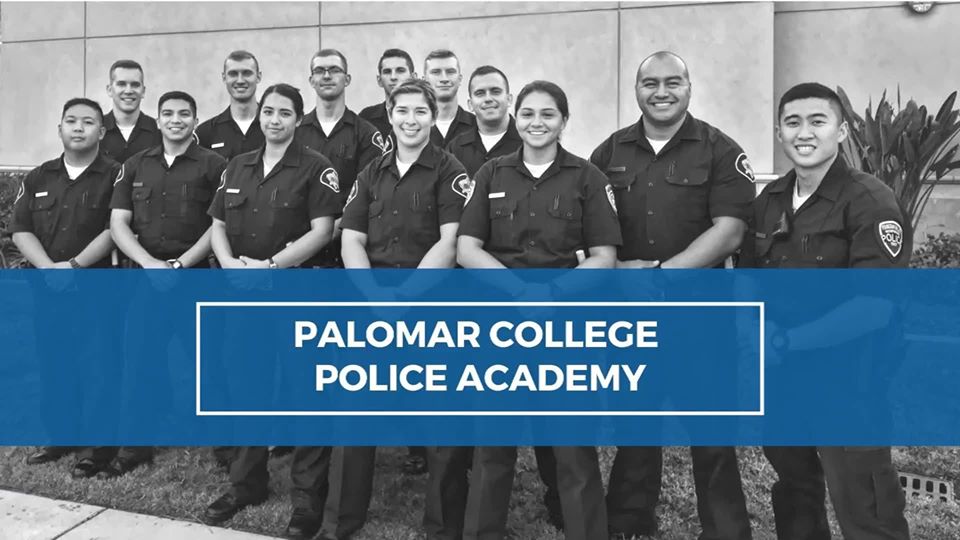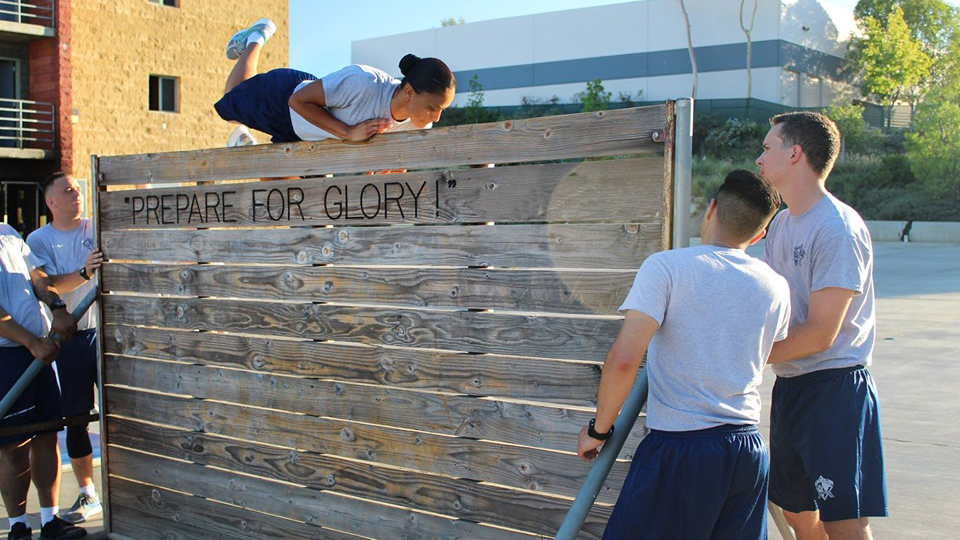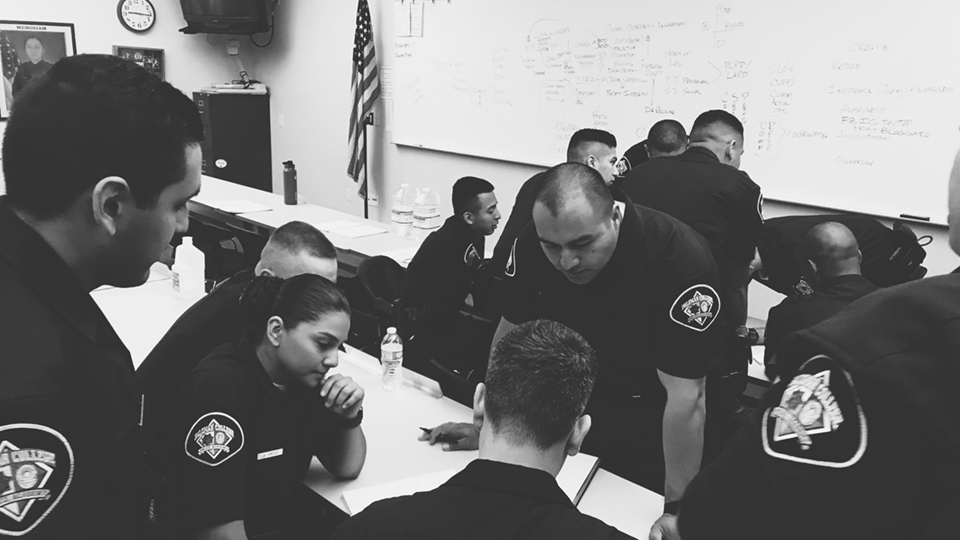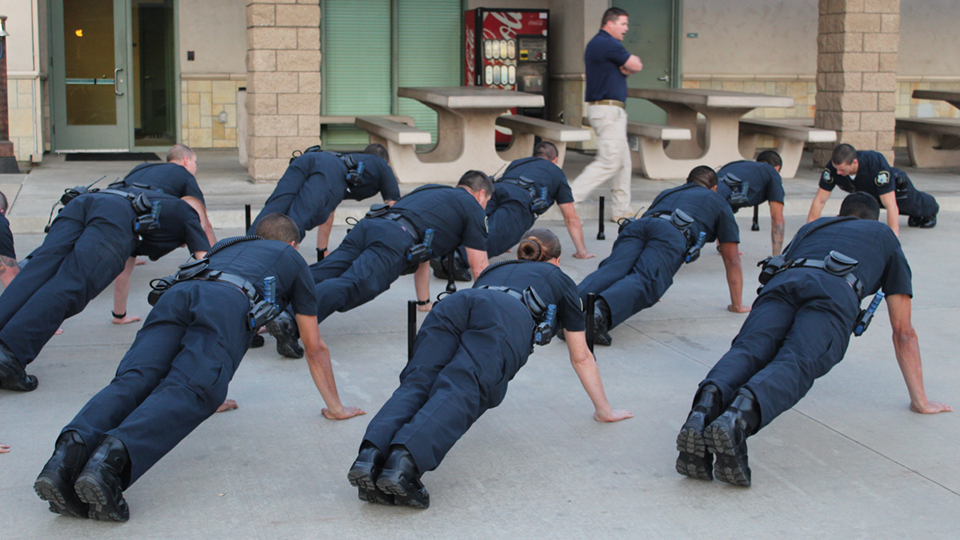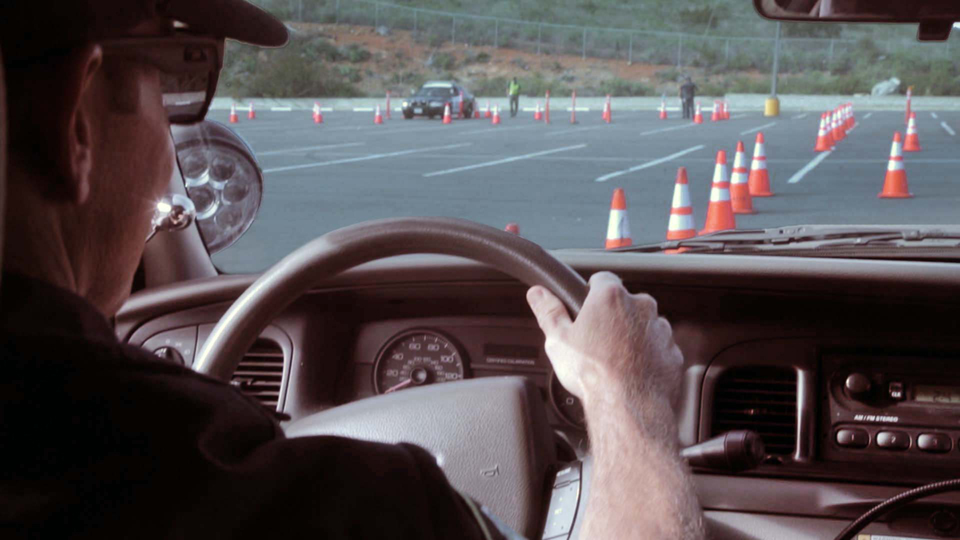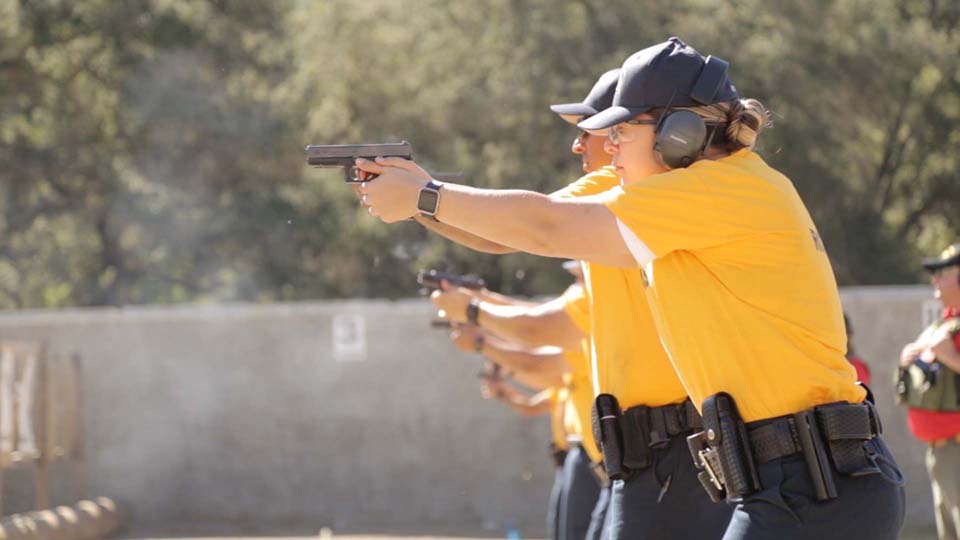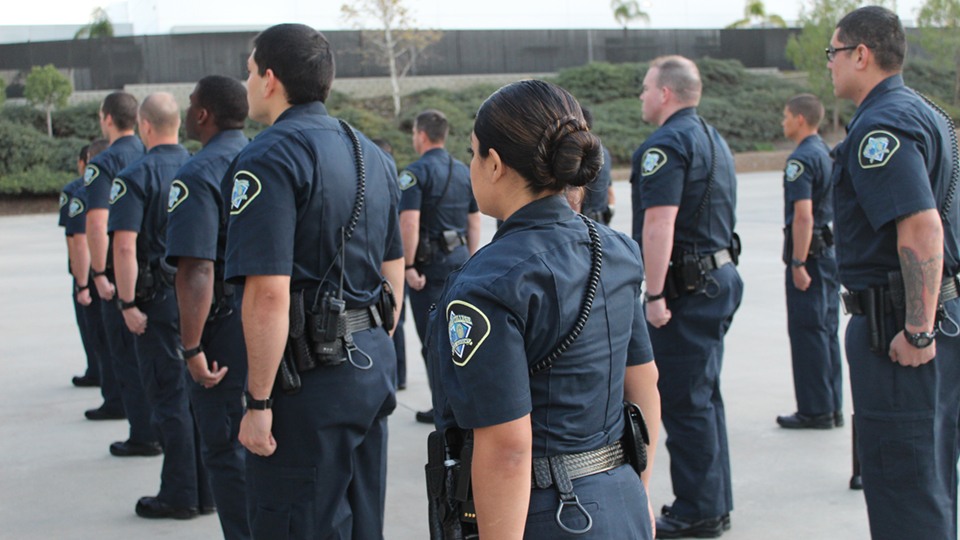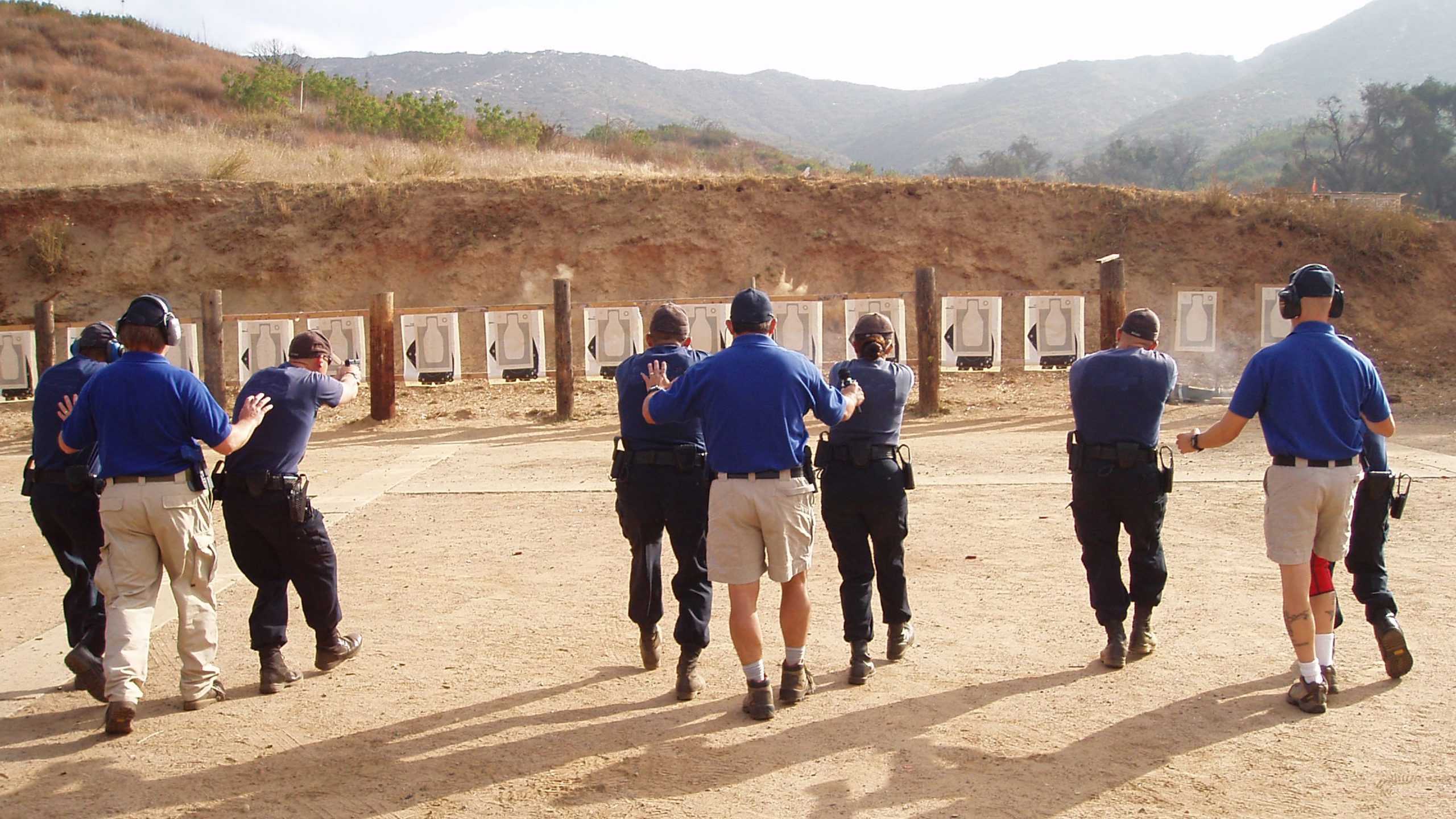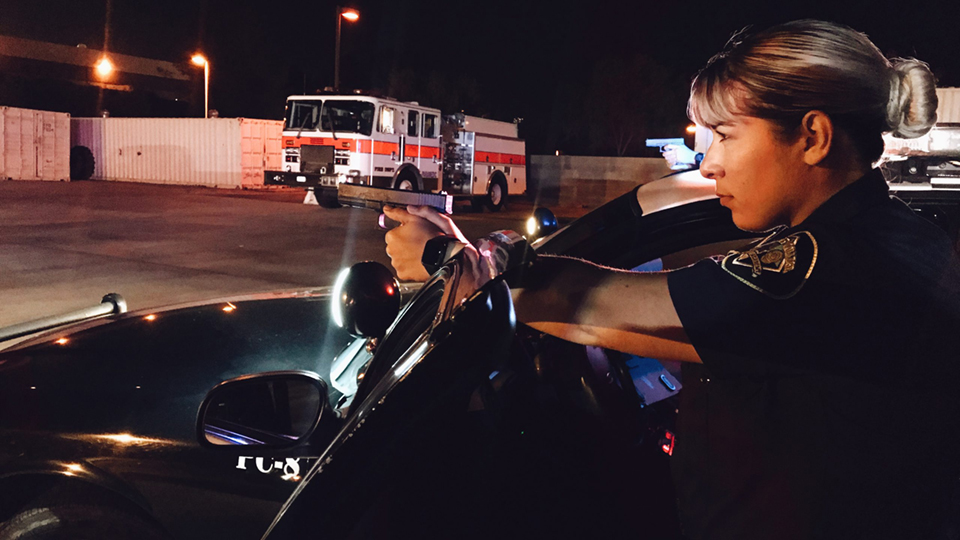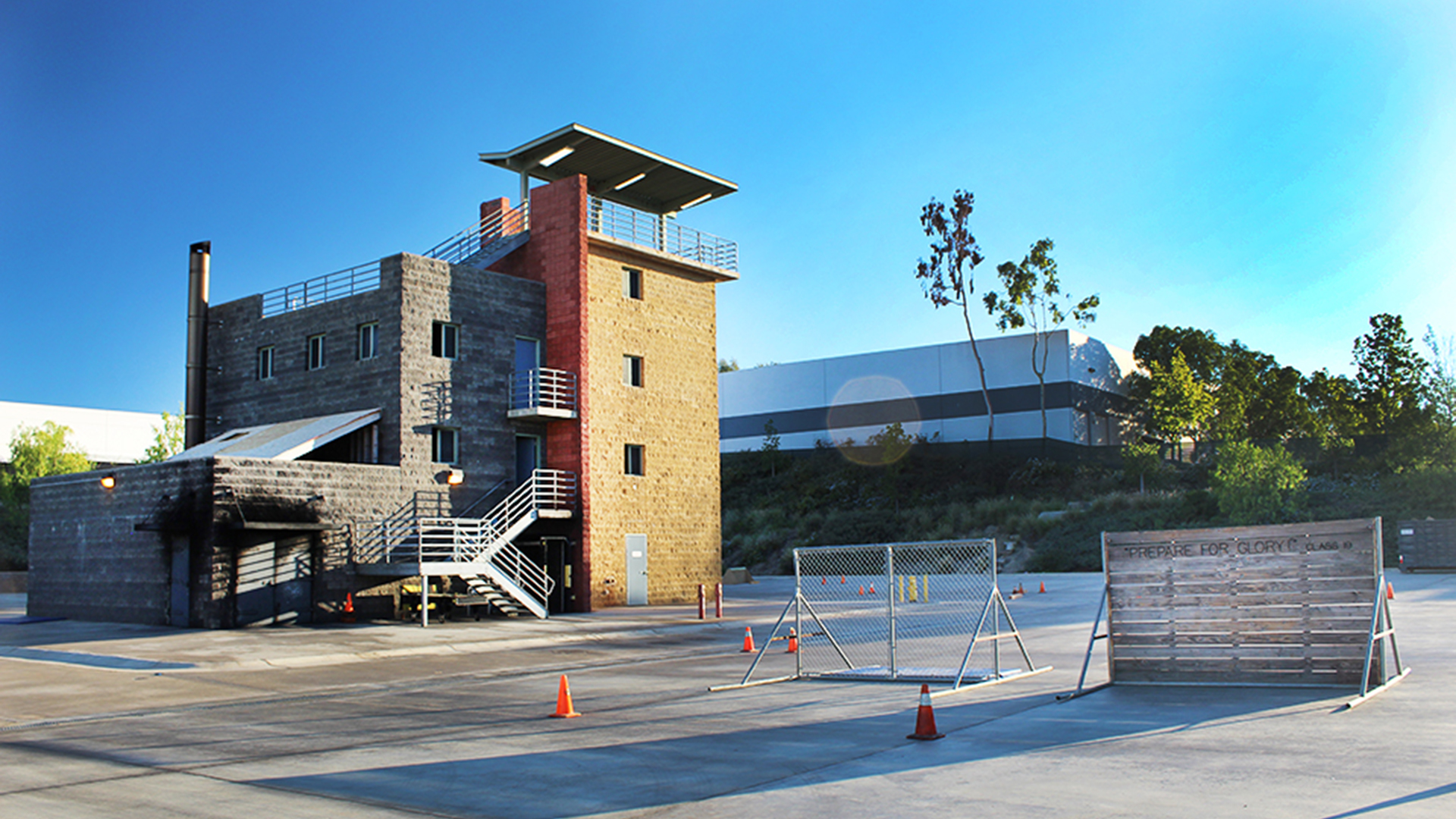"Professionalism Through Training"
We are no longer accepting applications for Module III of the 2025 Police Academy.
The academy begins on January 4, 2025.
We are now accepting applications for Module II, which begins April 10, 2025.
Prior completion of Module III is required. The deadline to apply is February 7, 2025.
To receive information and updates about the academy or courses we offer, please join our Interest List
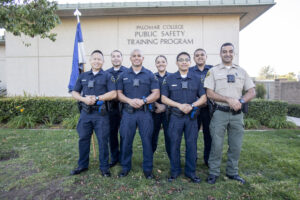
Public Safety Programs offers the POST-Certified 40-hour PC 832 Arrest Course.
Click here for details and course dates.
To view our brochure, click here.
As a dually accredited program, the Palomar College Police Academy is the best choice for future law enforcement professionals. The Basic Police Academy Program is certified by the California Commission on Peace Officer Standards and Training (POST) and recognized by the Western Association of Schools and Colleges (WASC).
All academy staff are recognized law enforcement professionals and current subject matter experts. As full-time law enforcement officers and acting deputy district attorneys, academy instructors & staff continuously develop and refine the training and curriculum that is critical to the future success of Palomar College Police Academy Recruits and graduates.
Our program is a modular format, which allows recruits to either complete the entire year of training or to attend in modules. Modules are completed in descending order: Module III, then Module II, and then Module I. For more information about this format, click here.
Any academy training program offered is with the approval of the California Commission on Peace Officer Standards and Training (POST).
Training is conducted at the Public Safety Training Center located at 182 and 184 Santar Place in San Marcos, CA. This facility is fully equipped with law enforcement and general public safety equipment and classrooms.
Modules are completed in descending order (Module III, then Module II, and finally Module I).
We hold one academy class per year, which begins in January with the mandatory Police Academy Preparation Course.
If attending the entire program (Modules III, II, and I), the course is completed in mid-December each year.
Start dates of any academy training program are with the approval of the California Commission on Peace Officer Standards and Training (POST).
We are no longer accepting applications for Module III of the 2025 Police Academy, which begins in January 2025.
We are accepting applications for Module II (prior completion of Module III is required). See the relevant dates and deadlines listed below for further details.
Application Deadlines for Class 34 (2025 Academy):
- Module III or Full Year: Friday, November 1, 2024 at 11:00 pm
- Module II: Friday, February 7, 2025 at 11:00 pm *Click here to Apply*
- Module I: Friday, May 9, 2025 at 11:00 pm
Applicants will be required to submit additional documentation and may be asked to meet with the Academy Coordinator prior to admission. Further information will be provided to applicants following receipt of their academy application. Acceptance decisions will be made after the application deadline. The most qualified applicants will be accepted into the Palomar College Police Academy Program and space will be limited. All notices will be sent from policeacademy@palomar.edu. Applicants should add the academy email to their safe senders list and monitor their spam/junk folders to ensure they receive all correspondence.
Mandatory Academy Preparation Course for Police Academy Class 34 (2025 Academy*):
*This is restricted to those recruits accepted into the program
There is a mandatory Police Academy Preparation Course (AJ 85) required for all recruits accepted into Module III. This course begins on January 4, 2025.
Mandatory Academy Orientation for Police Academy Class 34 Modules II and I (2025 Academy):
There is a mandatory Orientation Day for recruits accepted into Modules II or I:
- Module II: Saturday, February 22, 2025
- Module I: Saturday, May 17, 2025
Location: Public Safety Training Center
Address: 184 Santar Place, San Marcos, CA 92069 (PSTC Training building in front of fire tower)
Note: The first portion of Academy fees will be due at the start of the Police Academy Preparation Course.
Academy Class 34 Start Dates (2025 Academy):
- Police Academy Preparation Course: Saturday, January 4, 2025
- Module III: Saturday, February 1, 2025
- Module II: Thursday, April 10, 2025
- Module I: Tuesday, July 8, 2025
The Police Academy Preparation Course will be on Tuesdays, Thursdays, and Saturdays for 4 weeks prior to the start of Academy Module III. When Module III begins, recruits will attend training with the following schedule for the duration of the training program:
| Day** | Hours |
| Tuesday | 5:30 pm - 10:30 pm* |
| Wednesday | 5:30 pm - 10:30 pm* |
| Thursday | 5:30 pm - 10:30 pm* |
| Saturday | 8:00 am - 5:00 pm* |
* Recruits are required to arrive 30 minutes prior to the start of training.
**Courses may have adjusted hours on some Saturdays (five times total) or may be conducted on some Sundays (three times total per academy). Recruits will be notified of any changes in the academy schedule in advance.
Palomar College Basic Police Academy was redesigned in 2016 as a modular Regular Basic Course (RBC) training program. Those wishing to pursue a full-time position as a peace officer would attend the entire year-long program to be hired as a full-time sworn peace officer in California. The modular format also meets the needs of those aspiring to be Level III, Level II, or Level I reserve police officers. Modules are completed in descending order: Module III, followed by Module II, and then Module I.
The modules do not have to be completed consecutively in one year. For example, one could complete Modules III and II, leave the program, and then return the next year to complete Module I. Also, the modules do not need to be completed at the same training facility. A recruit could complete Modules III and II at another facility and then take Module I at Palomar College.
Students must contact the Palomar College Admissions Office and/or Counseling Services to verify eligibility for the Associate’s Degree program. Students who complete all three Modules are eligible to apply for the Basic Police Academy Certificate of Achievement. The Police Academy units satisfy required core courses for the Associate's Degrees in Administration of Justice.
Police Academy Self-Assessment
This assessment is designed to assist you in determining your readiness and suitability for the Police Academy program. The academy is unlike traditional college courses and this self- assessment should help you determine if this is the right time for you to apply to the program. You need to be 100% committed to the program and take it seriously as the training expectations are high and the time commitment is extensive.
NOTE: The academy is not a hiring agency. All agencies have their own background policies when it comes to considering prior criminal activity, driving record, drug use (including marijuana), and other issues that may be barriers to employment in the law enforcement field. Not all background matters will permanently hinder hiring ability, but some may be current disqualifiers due to the recency of the events.
The self-assessment is a tool for you to see if you are ready to take the next step.
1. Do you have all the necessary finances in order?
Academy costs include tuition/enrollment fees, books, uniform costs, DOJ and medical clearance fees, equipment, and ammunition, totaling approximately $5200 for the entire academy. Approximately one third of this cost is required at the start of the program due to enrollment fees, purchasing uniforms, equipment, and other required academy materials. The various types of financial aid (FAFSA awards, California College Promise Grant, GI Bill, tuition assistance, etc.) generally do not cover all academy expenses and the disbursement of financial aid does not occur before certain expenses must be paid. Additional costs are spread out throughout the year of training. Applicants should verify if they are eligible for any type of financial aid (contact the Financial Aid Office) and learn what that aid will cover. There are no grace periods or extensions for fee deadlines related to the academy, so you should be prepared for the costs in advance. Check the Academy Costs and Fees section for further details (Cost-and-Fees).
2. Are you physically ready?
The Police Academy is a physically rigorous training program that prepares recruits for the physical demands of the profession. You should be in shape PRIOR to starting the academy, not expect to get in shape as a result of the program. There is physical activity every day in the training, which varies from general exercises (pushups, pullups, squats, burpees, etc.) to intensive physical training sessions.
You will need to show up on the first day of the Police Academy in reasonable physical shape already actively engaged in a personal physical conditioning program performed 3-5 days a week.
You will, at a minimum, need to do the following:
- Aerobic capacity: jog for at least 20 minutes (about 2+/- miles) within your personal aerobic conditioning range – without stopping. This means different recruits will run at different paces.
- Core strength: sustain a basic static plank position for about 60 seconds.
- Abdominal strength: perform at least 30 bent-leg sit-ups in a minute.
- Integrated strength: perform at least 10 four-count burpees (up-downs) at a slow pace without stopping.
- Upper body strength: perform at least 10 full-range pushups without stopping.
- Flexibility and range of motion: have reasonable flexibility and range of motion from having performed a variety of dynamic and static movements.
- Body Mass Index (BMI): show up with a reasonable BMI. Should you be carrying excessive BMI, we encourage you to lower your BMI to reduce the risk of injuries and enhance your ability to be successful throughout all physical aspects of the police academy. Here is one of many excellent websites on BMI: http://www.cdc.gov/healthyweight/assessing/bmi/
It is recommended to follow a “Couch to 5K” style program, which conditions your body to go from zero exercise/activity to being able to run a 5K in just 8 weeks. (www.c25k.com)
3. Are you mentally ready? Do you think well when under stress? Can you control your emotions in high-stress situations?
Law Enforcement is a stressful and demanding profession. The academy utilizes “stress inoculation” training to acclimate recruits to the stressors that will be experienced in the field. The program requires you to think quickly on your feet, follow directions, and respond calmly under emotionally tense conditions. Officers are expected to operate proficiently in a fast-paced and diverse environment which can include sudden changes, physical exertion, and traumatic situations. Preparing both physically and mentally is an important step in being ready to undertake a position as a peace officer. If you have little experience with managing stress or do not function well in high-stress situations, you are cautioned to consider if now is the right time to attempt to enter an academy. Effective stress management skills are key to succeeding as a recruit and as a peace officer.
4. Do you take written tests well? Do you have strong writing skills?
The academy training involves instruction on approximately 50 different law enforcement subjects and skills, with required tests on most subjects. Strong study skills and test taking abilities are essential to passing the academic components of the program.
Many don’t think of law enforcement as a profession that involves a lot of writing or paperwork; however, report writing is a primary function of the job. The ability to accurately and proficiently document what occurred through written reports used throughout the criminal justice system requires strong writing skills. Those who have not taken college-level English composition or writing courses are strongly encouraged to take these courses before attending the academy. Applicants are recommended to have completed the English 50 course at Palomar College (or equivalent) before applying. This provides the necessary foundational writing skills needed for the Report Writing course within the academy training.
5. Can you be around and handle firearms?
This program has an extensive firearms training program that requires qualifications in both handgun (9 mm) & shotgun (12 gauge), which includes day and night shoots. Prior firearms and shooting experience is not necessary, however, a fear or hesitation in handling firearms must be overcome to develop appropriate marksmanship skills.
6. Have you had recent traffic violations, including DUI’s? If so, these could be disqualifiers.
Agencies may reject applicants that have had a DUI or other driving-related misdemeanor offenses within 7-10 years of applying, or too many moving violations within the past 3-5 years. Officers are expected to operate vehicles in a safe manner, including when responding to emergencies. If you have numerous traffic offenses, it shows a disregard for traffic laws, unsafe driving practices, and a failure to learn from past violations or improve safe driving skills. Those who have a history of unsafe driving pose a liability to an agency, therefore it is often a disqualifier for hiring.
7. Have you used marijuana within the last 3 years? Have you used other drugs within the past 5 years? If so, you will need to wait to apply with most agencies, as this could be a disqualifier.
Even though marijuana has been legalized in some states, including California, law enforcement follows federal law guidelines, which still considers marijuana an illegal substance (including CBD products). Use of marijuana, illegal drugs, or misuse/abuse of prescription medications are risk-taking behaviors that are considered an indication of bad judgment and poor decision making. Both the recency and frequency of drug use may hinder eligibility for employment with most agencies. The repeated use/abuse of certain drugs may be a permanent disqualifier to being able to be hired as a peace officer.
8. Have you been arrested or convicted of any crimes? Have you recently committed crimes that would result in an arrest, if caught?
Criminal convictions for certain misdemeanor crimes prohibit possession of a firearm for ten years. Conviction of any felony crimes also prohibits firearm use. These would be automatic disqualifiers for the academy or law enforcement employment. In addition, convictions of any offense where a person is still under supervision through the court (“summary probation”) or a supervising agency (County Probation) would be ineligible for the academy. Prior criminal convictions are often a disqualifier with hiring agencies, depending on the offense(s), the recency, and/or severity of the charge(s). This often applies to arrests even without a conviction or to criminal acts even though you were not caught or arrested.
9. Are you good with time management? Does your work schedule conflict with the hours of Academy training?
POST has strict regulations about attendance for mandated training and required activities. Failure to be present for certain training, or to miss too many hours of instruction, requires dismissal from the academy. Absences cannot be granted for vacations, special events, or work conflicts. Before starting the academy, ensure that you are able to arrive at the academy 30 minutes prior to the start of instruction each training day and that your employer understands you cannot work during scheduled academy training. Repeated tardiness often indicates poor time management skills and may lead to dismissal from the program.
10. Can you follow directions and take orders?
The Police Academy program is paramilitary in nature. Recruits will be expected to learn and abide by strict rules and regulations that will dictate appropriate conduct, as well as acclimate recruits to the policies and procedures of law enforcement agencies. All recruits will be expected to take orders and follow directions throughout the academy, and each person will serve in a leadership position at some point during their training to develop skills in this area.
11. Do you get along well with others? Can you accept criticism from peers or supervisors?
Your performance will be continuously assessed by your peers and training officers throughout the program. Peace officers face constant scrutiny from the public, government officials, and supervisors. It is critical that officers are able to follow regulations and uphold the law and to operate professionally and ethically, even with criticism. Teamwork is a critical component to law enforcement, even though officers may work independently on many calls for service. It is important that academy recruits learn to work together, as well as provide feedback to one another on strengths and weaknesses. Training Officers will formally evaluate recruits throughout their training in a manner consistent with how agencies evaluate new officers in Field Training Programs, as well as routinely in agency performance evaluations. The ability to work well with others, receive constructive criticism, and take corrective action are important skills to possess in a position that is highly visible to the public.
12. Can you devote adequate time to study and prepare?
In order to attain a successful class ranking in a very competitive academy environment, you must put forth your best effort and eliminate all personal distractions. The academy program is a considerable time commitment. There are 23 hours of training per week, which does not include travel time to and from the academy. Applicants should plan to spend a minimum of 5-10 hours per week outside of training for studying, preparing uniforms and equipment, and working on assignments. Good study habits and organization skills are important components to academy success, as well as devoting adequate time for proper preparation. Many academy recruits juggle full-time employment and families while attending the academy, although it is not without challenges. Those who are most successful have effective time management skills and prioritize their academy training to be able to meet or exceed academy standards.
13. Do you have the full support of your family? Will you encourage your family to assist you in your training?
Family support is a critical factor while attending the police academy. A large percentage of your time will be devoted to your academy training for the year. This will cause you to miss time and some special events with your loved ones. Having their support and understanding of what will be expected of you is important in lessening the stress it may create when unavailable or having to focus on your academy work. Family members can become involved by helping you with your studies, assisting in preparing your uniforms or equipment, and by lessening some responsibilities at home to allow you the time needed for academy preparation.
14. What is your employment history and life experience?
Part of the background investigation process is to evaluate all aspects of an applicant’s history, including employment, education, residential history, finances, driving record, and past criminal behavior. An applicant is being evaluated on the POST Job Dimensions, which outline suitable characteristics and traits of peace officers. State law requires that peace officers must be a minimum of 21 years of age. More importantly, agencies are looking to hire those candidates who have positive work history, safe driving habits, strong interpersonal and communication skills, and sound decision making and judgment. These traits and experience are developed over time and indicate that an applicant has the maturity and life experience to take on the responsibilities and stressors of a peace officer position. Evaluating yourself against the POST Job Dimensions is recommended to assess your suitability to get hired, which in turn indicates a readiness to enter a police academy training program.
15. Do you match some of the disqualifiers to getting hire that are mentioned above? Should you still attempt to attend the academy?
The Police Academy program is not a hiring agency and does not guarantee employment, even with successful completion of the program. The POST Academy Certificate of Completion earned upon graduation is valid for three (3) years from the date of graduation. Job skills begin to diminish after training is completed, unless you are actively maintaining those skills through continued study and practice. It is not recommended to attend the academy until you are eligible for employment and there are no recent or substantial background issues that would hinder the ability to be hired into a law enforcement position.
Hiring requirements vary with different agencies and there are many departments throughout the state with available job opportunities. We encourage you not to focus solely on working at one specific agency. Be willing to explore a variety of agencies that may be suited to your background and experience.
Your academy performance will have a direct effect on whether you may be hired, since agencies review academy recruit files to assess your performance in police training. You should strive to attend the academy when you can devote adequate time to the program to be the most successful.
The costs and fees associated with the Palomar College Police Academy are distributed according to the respective module of instruction. Due to changes in the availability of service(s), product(s), and other non-specific & expendable items, the Palomar College Police Academy cannot guarantee the accuracy of the cost data. The Palomar College Police Academy is not responsible for changes to published, unpublished, and/or distributed materials associated with academy activities. All tuition prices are based on $46.00 per unit for in-state residents. Tuition prices are higher for out-of-state residents. Current active duty military and non-active or retired U.S. armed forces veterans should contact the Palomar College Veterans Services Office for specific information on GI Bill, tuition assistance, and other veteran support programs.
*NOTE: All fees are approximate and are subject to change. Fees are due prior to the start of each module. Further details and specific dates will be provided to recruits accepted into the Police Academy program.
**NOTE: Students should plan for extra incidental costs such as transportation expenses, school supplies, uniform/gear maintenance, dry cleaning, etc.
Financial aid may be available to those who qualify. Contact the Financial Aid Office for additional information at 760-744-1150 ext 2366.


